In recent years, there has been a leap in human-computer interaction (HCI) research on technologies supporting health behaviour change, more precisely persuasive technology. Persuasive technology is defined as any interactive computing system designed to change users’ attitudes or behaviours, for instance in relation to their lifestyle.
Mobile phones offer low-cost and highly accessible options for supporting individuals in maintaining positive health behaviours. With the increasing number of smartphone users worldwide, persuasive technology has the potential to influence and motivate attitudes and behaviours related to health and well-being. This final-year project investigated the impact of persuasive strategies by proposing a mobile app, MindfulMeals, and observing user experience.
Behaviour change is a complex and long-term process with the possibility of failure. It is, therefore, challenging to demonstrate significant behaviour change within a short time frame. In order to mitigate this challenge, the project employed a mobile app incorporating five different intervention strategies, namely, tailoring, reminders, praise, rewards, and self-monitoring, with the aim of offering effective techniques that would not demand a complete behaviour change.
The development of the MindfulMeals app followed a design process that revolved around the end user, starting with a survey study to gather feedback on similar existing mobile health (mHealth) apps, such as MyFitnessPal. This feedback was incorporated into the app’s design process. The app’s designs were created using Figma to ensure a conventional and easy-to-use user interface. The app was developed using React Native, a cross-platform framework. To ensure that the app was user-friendly and to address any issues that may arise, a usability study was conducted at the end of the development process, following the user-centric design process. The accompanying image presents two screens of the final app, offering possible intervention strategies.
At the evaluation stage, a controlled experiment was conducted over a two-week period to assess the app. Each persuasive feature was evaluated individually, based on the respective intervention strategies. Since repeated behaviours tend to be indicative of future behaviour patterns, reminders and self-monitoring were evaluated through pattern analysis. Sentiment analysis was used to evaluate the strategies of rewards, praise, and tailoring, as patterns alone may not be reliable indicators of their effectiveness. Capturing the emotional responses of individuals through questionnaires was important, as theory suggests that individuals are more likely to be motivated to continue positive behaviours if they are happy. Data was collected anonymously to understand the public’s views on the MindfulMeals app, usage patterns, and preferences. A user-experience questionnaire was carried out at the end of this process to evaluate the impact of persuasive technology on the users.
The results of this study contribute to the understanding of the impact of persuasive technology on user experience in mHealth. By tying the evaluation of the app to the behaviour-change strategies, the study offers an insight into the effectiveness of persuasive technologies in promoting health-related behaviours. The findings of this research have implications for the development of future mobile apps aimed at influencing attitudes and behaviours with regard to health and well-being.

Figure 1. Screenshots of the MindfulMeals app showcasing intervention strategies including rewards, self-monitoring, and tailoring to promote health behaviours
Student: Adam-Ryan Ali Farag
Supervisor: Dr Conrad Attard
